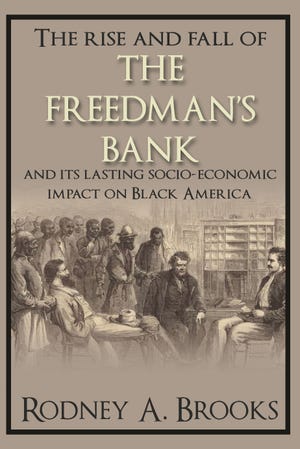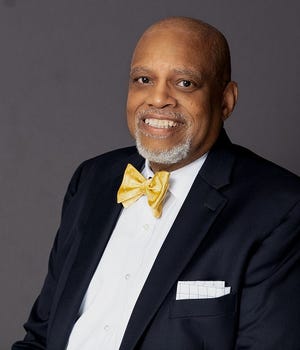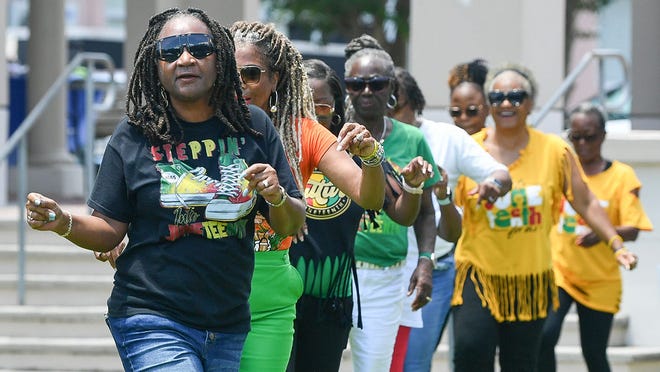
In The Rise and Fall of the Freedman’s Savings Bank and Its Lasting Socio-economic Impact on Black America (Spiramus Press), former USA TODAY Deputy Managing Editor of Money Rodney A. Brooks tells the story of an institution created to give newly emancipated African Americans a place where they could deposit their earnings and begin to build wealth. Just nine years later, in the wake of corruption, mismanagement and fraud committed by its white management, the bank was shuttered.
Brooks, an award-winning financial journalist, spoke to USA TODAY’s Money and Consumer News editor Charisse Jones about the bank’s creation, collapse and lingering legacy 150 years later. The interview has been edited for clarity and length.
Why did you want to write this book?
I think it’s a lost piece of history. So many people know about the Freedmen’s Bureau but the Freedman’s Bank, even with its sad ending, is not something that’s really taught. It’s also an underrated cause or root of the racial wealth gap because the money that people lost when the bank folded – which was $3 million dollars in 1874 but $80 million in today’s dollars – that money would have gone to educating their children, buying homes and farmland. So the loss of generational wealth was immense.
Can you say more about how the loss of those savings impacted the building of generational wealth?
White Americans have a homeownership rate of about 73% and Black Americans have a homeownership rate of 42/43%. Had the bank not failed, and people had not lost their money it would have meant Black former slaves would have been able to buy land, educate their children and build houses, and those are all important components of the racial wealth gap.
Learn more: Best current CD rates
Another thing that has carried on is our distrust of the banking system. You might say, ‘This bank folded 150 years ago,’ but we still have a strong distrust of the financial system. This is not to take away from the fact that discrimination in the 30s, 40’s and 50’s at these financial institutions – and some of it is still happening today – is contributing. But there are things that people pass onto their children and grandchildren. A distrust of the banking system still exists and that’s still impacting the wealth of Black Americans.
Black homeownership:60 years after ‘I have a dream,’ where do MLK’s hopes for Black homeownership stand?
What’s the impact of that distrust?
One of the reasons the bank was established in 1865, besides providing a place for former slaves and Black Civil War veterans to save money, is it was also supposed to be able to provide financial education. So, imagine if financial education had gone back to 1865 for these families not only through the savings process, (but) that knowledge was also supposed to be passed onto Black Americans through jobs and training. They were supposed to be staffers, tellers and managers at these bank branches. Had that happened you would have generational knowledge of finance that does not exist today.

You note that the bank was initially successful. How so?
Black people looked at it as a Black bank though it wasn’t. It was created by Congress and had a board of white men in New York. People used to dress up to go to the bank because it was a big deal. It grew to 37 branches and 60,000 depositors, so you had people using it and actually gaining interest on their money. Twenty percent of the depositors were children. So even though it was undercapitalized, the success was in how fast it grew and how far the reach was. But that also proved difficult. It could take two weeks for communication to go from the main branch, and many of the people running the (local) branches didn’t have the financial experience or wherewithal to be in those jobs. Some were incompetent and some were outright thieves.
Some people don’t want to look at how systemic practices or neglect can have an impact decades later. What do you say to that?

It’s very hard to argue against something needing to be done when you look at what brought down the Freedman’s Bank. When you look at the housing disparities, the income disparities, there is much that ties racism and discrimination to these disparities. But there will always be people who want to deny history and I talk in the book about how some of these states are trying to whitewash history and remove it from schools so what little people know about Black history is reduced even more.
What are some of the ways we can remedy the racial wealth gap?
There’s a handful of things you can do. All of them require some level of government support and that brings out the opposition, especially from conservatives, but let’s start with reparations. One of the big arguments against reparations is how do you identify the people you’re supposed to provide reparations for. Well, with the Freedman’s Bank, the records are still there. The National Archives in College Park, Maryland has hundreds of passbooks with peoples’ names and information. So if you want to talk about reparations for this specifically, there are historical records that could provide some guidance to finding the descendants of these people.
Baby bonds is another. Sen. Cory Booker (D-New Jersey) has proposed legislation that would provide a savings account to every child born in America and money would be added every year and there would be more money added for the lower income families. So when a baby of any color got to be 18, they would have money to buy a house, buy a car. Morningstar, which is a financial services company, basically said baby bonds could help reduce the racial wealth gap by about 50%.
Increasing the number of Black families who own homes can have a huge impact but to get more Black families into homes, the biggest obstacle is the down payment. So programs that will help people to save the down payment, or finding alternative ways to do that down payment, will have a big impact on the racial wealth gap.






